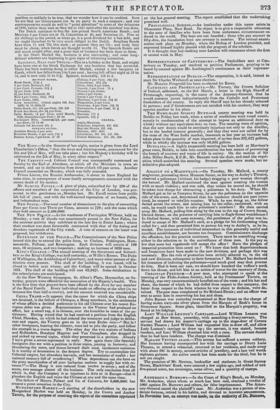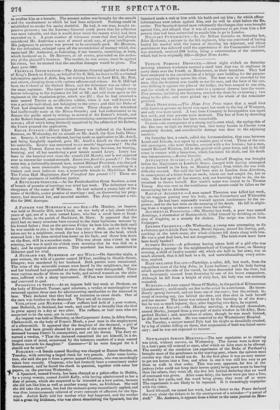ANDERDON v. BURROWS.—In the Court of King's Bench, on Monday,
Mr. Anderdon, about whom so much has been said, obtained a verdict of 500/. against Dr. Burrows and others, for false imprisonment. The Attor- ney-General stated the plaintiff's case. Mr. Anderdon was a person of mo. derate fortune, retired in his habits, and devoted to innocent amusements. Tavern, for the purpose of receiving the report of the committee appointed In November last, an attempt WAS made, oaa the authorityBurrow, to confine him as a lunatic. The present action was brought for the assault and the confinement to which he had been subjected. Nothing could be established to render his sanity doubtful. He had, it was true, bought ex- pensive pictures ; but the Attorney.General could prove that his collection was most valuable, and that it would draw twice the money which had been expended on it. A great number of witnesses swore that they had always considered Mr. Anderdon a man of sound mind, nay, of great intelligence. His judgment in pictures was proved to be extremely good. Mr. Denman, for the defendant, enlarged upon all the eccentricities of manner which cha- racterized Mr. Anderdon, as indicating, if not insanity, something, at least, which bordered on it. Dr. Burrows, at all events, proceeded on the autho- rity of the plaintiff's brothers. The verdict, he was aware, must be against his client, but he trusted that the smallest damages would be given. The Jury gave 500/.
• CRIMINAL INFORmATLoN.—The Attorney-General applied to the Court of King's Bench on Friday, on behalf of Sir IL Hill, for leave to file a criminal information against J. Jebb, Esq. for writing letters to Lord Hill, Mr. Peel, and others, charging them with various offences and crimes. Sir R. Hill had been the Colonel of the Oxford Blues, and the defendant was an officer in the dame regiment. The latter charged that Sir R. Hill had bought troop horses belonging to the regiment for 10/. or 121., and sold them again to the regiment at the regulation-price, which was 251.; that he had returned a man named Tunier as an effective soldier, when it was well known he was a private individual, not belonging to the corps ; and that the Duke of York had dismissed him from the service. These charges the defendant had ineffectually made at the House Guards ; and had endeavoured to in- fluence the, public mind by writing to several of Sir Robert's friends, and to Sir Robert himself, anonymous letters containing statements of the grossest nature ; all of which being distinctly negatived by the affidavit of Sir Robert, the Court granted the application.
EQUAL J trsTice.—Henry Edgar Kearry was indicted at the London Sessions, on Wednesday, for an assault on Mr. Astell, the East India Direc- tor. Kearry, it will be recollected, having made an application to Mr. Astell, and being haughtily repulsed, gave Mr. Astell a knock on the nose with his umbrella. Kearry was sentenced to six months' imprisonment ! On the sense day, Thomas Eaton was indicted at the Surry Sessions, for beating, bruising, and all but murdering a poor female named Leary. Leary has been in the hospital ever since the assault (3d March). and is not expected ever to recover her wonted strength. Eaton was fined ten pounds ! ! On the same day, a fashionably-dressed man, named Michael Pressford, was charged with using most abominable language towards, and with assaulting in a violent and most indecent way; a respectable female in Blackfriars Road. The Union Hall Magistrates fined Pressford two pounds ! ! ! These are three fair specimens of indifferent justice.
A REVEREND SEDUCER.—At the Pembrokeshire Great Sessions, a case of breach of promise of marriage was tried last week. The defendant was a clergyman of the name of Williams. He had seduced a young lady of the name of Griffiths, under promise of marriage ; and, on discovering her preg- nancy, had deserted her, and married another. The Jury returned a ver- dict for 2001. damages.



















 Previous page
Previous page